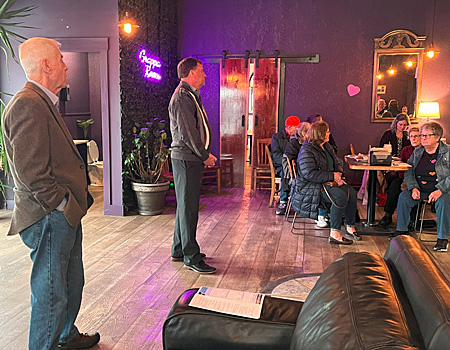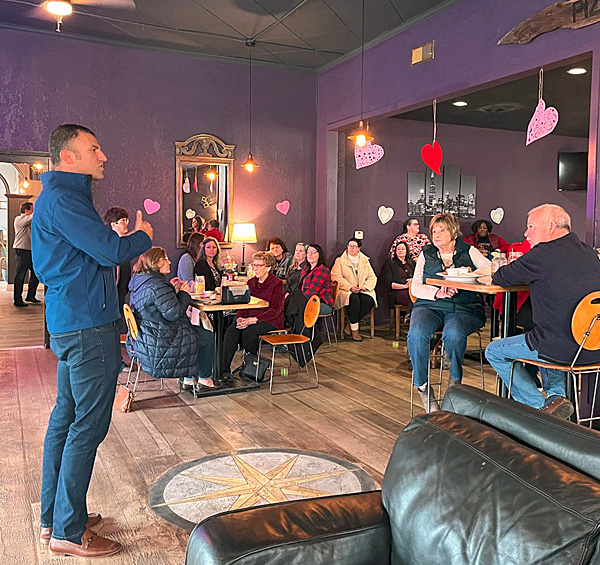 |
| State Sen. Ed Charbonneau (left) and State Rep. Kendell Culp answer questions at the Winamac town hall meeting. |
The public had an opportunity to hear updates on proposed legislation and participate in a question-and-answer time. The town hall meeting was organized by Judy Heater and Pulaski County Human Services.
Congressman Rudy Yakym (R-IN2) discussed issues ranging from securing the U.S. southern border, safeguarding elections, trimming the nation’s budget and support for veterans.
He touched on ongoing efforts to pass HR2 Secure the Border Act introduced last year which would make various changes to immigration law.
He addressed the “need to elect a Republican president,” and to safeguard elections, such as updating voter rolls to ensure dead people aren’t voting. He also remarked there is “too much spending” in the national budget and spoke of his interest in veterans’ issues.
Yakym, along with State Sen. Charbonneau (R) and State Rep. Culp (R), responded to the story of a mother in attendance regarding support to care for her child with a rare progressive mitochondrial disease. It was noted that due to a billion-dollar shortfall in the Indiana Medicaid budget, the state will no longer allow parents to be paid caregivers for their children with severe disabilities through the Indiana Family and Social Service Administration (FSSA). Yakym promised to have his staff look into what sources of help may be available to the mother.
State Rep. Culp reflected on his first year in office, noting the “biggest surprise” to him was the “partisanship of the Indiana election division.” He, too, expressed a desire to clean up voter rolls, although he added elections are “very safe” in Indiana.
Culp reported he has introduced five bills in the current “short session” of the General Assembly. One is HB 1137 on civics education and religious instruction which sets forth certain requirements concerning civics education. The bill would require the department, in consultation with the civic education commission and the Indiana Bar Foundation, to report certain information and recommendations related to civics education to the general assembly. It would also require a principal to allow a student to attend religious instruction conducted by certain entities following the principal's receipt of written notice from the student's parent. The proposed bill provides that a student must not be habitually truant and be in academic good standing to be released.
Another Culp bill submitted is HB 1093 on employment of minors which would provide certain exemptions from the employment of minors law. It would repeal a provision concerning conditions for the employment of a minor as a performer. It would also provide exemptions from certain hour and time restrictions for the employment of a minor who is at least 14 years of age and less than 16 years of age. The proposed legislation removes language providing that a minor who is at least 14 years of age and less than 16 years of age may only work until 7 p.m. on a day that precedes a school day from June 1 through Labor Day.
A third bill introduced by Culp has received a letter of support from Indiana’s Republican congressional delegation. HB 1183 is a bill to protect Indiana’s agricultural land from being purchased by foreign adversaries. The proposed legislation provides that, beginning July 1, 2024, a real estate closing including agricultural land must include an affidavit in which the purchaser affirms that the purchaser is not prohibited from acquiring or leasing agricultural land. Provides that, beginning July 1, 2024, a prohibited person may not acquire or lease agricultural land or a mineral right or water or riparian right on agricultural land located in Indiana. The bill would require the attorney general to investigate an acquisition or lease of agricultural land if the attorney general believes the acquisition or lease is in violation of law. The legislation would also require that agricultural land or interests in agricultural land acquired in violation of law are subject to forfeiture to the state.
 |
| Congressman Rudy Yakym addresses the Winamac town hall meeting. |
State Sen. Charbonneau addressed one of the top issues before the 2024 General Assembly – the drop in reading test scores among the state’s third grade students. He reported that nearly 1 in 5 Hoosier third graders lack basic reading skills. Charbonneau has helped author SB1 which proposes boosting third grade reading scores by testing all students before they reach third grade, expanding summer school options for reading remediation and retaining more students who don't pass the state's reading exam by the end of third grade.
Charbonneau has also authored a bill to address child care access and affordability. SB2 would roll out multiple new policies to help more people become child care workers and cut certain regulations that drive up the cost of operating a child care facility.
"Child care is a huge infrastructure issue facing Indiana,” Charbonneau has said. “In order to help families remain happy and healthy, we need to offer options that can ease some of the burden. Senate Bill 2 would help more Hoosier families find reliable, affordable child care, ultimately helping improve our workforce."
Charbonneau also briefly mentioned a bill to enforce the state ban on sanctuary cities in Indiana has passed the senate. He referenced another bill that would require a locality to reimburse another town for “poaching” new police officers, and lastly proposed legislation that would limit the governor’s powers to extend executive orders during a state of disaster or emergency.
Questions from the audience dealt with education issues, and included an invitation from Eastern Pulaski Elementary School Principal Jill Collins for the legislators to visit the school to discuss reading skills education and other issues.
Superior Court Judge Crystal Kocher raised the issue of needed funds for rural counties to attract and reimburse public defenders. Pulaski County uses the services of four out-of-county attorneys, but she asserted that with the ability to pay higher wages plus benefits, the court would have an improved situation, especially with a higher volume of drug cases.
One person present expressed dismay with the county’s solar farm projects, while another asked for an update on proposals for a carbon capture and storage project in northwest Indiana.
Reported by Karen Clem Fritz, editor







